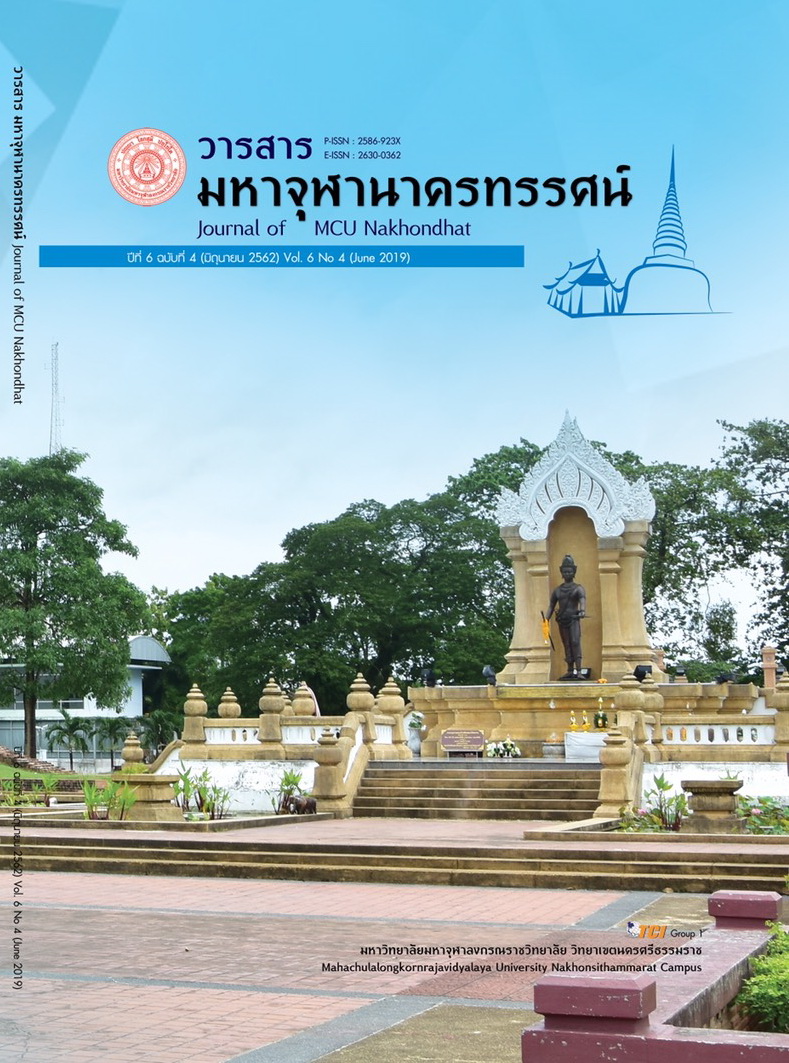BUDDHIST PSYCHOLOGICAL COUNSELING FOR SUFFERING REDUCTION IN ASTROLOGY
Main Article Content
Abstract
Abstract
The objectives of this dissertation were; 1) to study psychological principles and astrological counseling in accordance with Buddhist psychology in order to reduce suffering, 2) to synthesize astrological counseling principles according to Buddhist psychology to reduce suffering, 3) to present a form of astrological counseling according to Buddhist psychology to reduce suffering. This dissertation is a mixed research method, quantitative and qualitative research. The sample consisted of the astrologer from the Astrologer Association of Thailand in the Sangha Patronage, International Astrology Association, Thai-International Astrology Institute, Institute of Astrology and the Association of Destiny on the palm of 17 persons and 269 astrological consultants. The tools used in the research consisted of in-depth interviews and surveys. Statistics used include the average.
The results showed that:
- Principles of astrology counseling according to Buddhist psychology to reduce suffering give an importance to the person by encouraging service recipients to accept the experience (Suffering/Dukha), self-assessment completely, find the cause of suffering as really are (Samudaya), the cessation of suffering (Nirodha), path leading to the cessation of suffering (Magga). The service provider must be a person who has a friendly mind, caring, understanding the story and the feelings of the clients and accept the differences of counselees. The relationship between service providers and service recipients by the right view of the consultant service is more important than any technique.
- Synthesis of astrological counseling principles according to Buddhist psychology in order to reduce suffering, found that the astrologer provides individual assistance, including personal problems, education, occupation and family, etc., by submitting a good relationship between the astrologer and the counselees in order to reveal him-self and ready to change self-improvement. The consultation process takes time, capacity and continuous experience on both sides, If found that the counselee has misfortune to suffer, It is recommended to use consciousness, not negligence by encouraging. When the counselee had luck, warned him not to be careless and indulge in luck. The main Dhamma principle of the astrologer is the four sublime states of mind, five precepts. The counselee expects the qualifications of the astrologer in terms of wisdom, confidence and satisfaction, those with true knowledge contemplating, examining, discussing details before predicting and point out the solution, followed by in terms of precept (Sila), in terms of social and mental aspect and found that most astrologer gave the intellectual counseling namely, suggesting to use reason to solve the cause of the problem, followed by precepts, social and mental aspects.
- The form of astrological counseling according to Buddhist psychology should be focused on the person in accordance with the four noble truths process to develop the potential of the person to be able to accept, check for self-diagnosis, accept the changes of yourself and others and the actual environment which is based on the wisdom of the astrologer and counselees with the intellectual, precept, social and mental qualities that are suitable for the problem of the counseling.
Article Details
References
ดร.จีน แบรี่. (2549). การให้การปรึกษา. (พิมพ์ครั้งที่ 5). กรุงเทพมหานคร: เจริญวิทย์การพิมพ์.
พ.รัตนลักข์ (เปรียญ9). (2555). มหาศาสดาชี้มหันตภัยล้างโลก. (พิมพ์ครั้งที่ 2). นนทบุรี: ซีแอนด์เอ็น.
พรรณี ลีกิจวัฒนะ. (2556). การวิจัยทางการศึกษา. (พิมพ์ครั้งที่ 8). กรุงเทพมหานคร: คณะครุศาสตร์อุตสาหกรรม สถาบันเทคโนโลยีพระจอมเกล้าเจ้าคุณ.
พระธรรมปิฎก (ป.อ.ปยฺตโต). (2546). พจนานุกรมพุทธศาสตร์ ฉบับประมวลธรรม. (พิมพ์ครั้งที่ 12). กรุงเทพมหานคร: โรงพิมพ์มหาวิทยาลัยมหาจุฬาลงกรณราชวิทยาลัย.
พระธรรมปิฎก (ป.อ.ปยฺตโต). (2555). พุทธธรรม ฉบับปรับขยาย. (พิมพ์ครั้งที่ 32). กรุงเทพมหานคร: สำนักพิมพ์ผลิธัมม์.
พระธรรมปิฎก (ป.อ.ปยฺตโต). (2553). พจนานุกรมพุทธศาสน์ฉบับประมวลศัพท์. (พิมพ์ครั้งที่ 14). กรุงเทพมหานคร: ธนธัชการพิมพ์.
พระวิชัย วิชโย (แสงสว่าง). (2553). ศึกษาการบูรณาการหลักอริยสัจ 4 ในการให้คำปรึกษา. ใน วิทยานิพนธ์พุทธศาสตรมหาบัณฑิต. บัณฑิตวิทยาลัย มหาวิทยาลัยมหาจุฬาลงกรณ์ราชวิทยาลัย.
มหาวิทยาลัยมหาจุฬาลงกรณราชวิทยาลัย. (2525). พระไตรปิฎกภาษาไทย ฉบับมหาจุฬาลงกรณราชวิทยาลัย 2539. กรุงเทพมหานคร: โรงพิมพ์มหาวิทยาลัยมหาจุฬาลงกรณราชวิทยาลัย .
วรพล ไม้สน (พลังวัชร). (6 พ.ย. 2559). หลักการ วิธีการ เป้าหมาย ในการปรึกษาทางโหราศาสตร์. (นางณฐณัช แก้วผลึก, ผู้สัมภาษณ์)
วัชรี ทรัพย์มี. (2554). ทฤษฎีให้บริการปรึกษา. (พิมพ์ครั้งที่ 5). กรุงเทพมหานคร: โรงพิมพ์แห่งจุฬาลงกรณ์มหาวิทยาลัย.
วิกิพีเดีย สารานุกรมเสรี. (2559). กรุงเทพมหานคร. เรียกใช้เมื่อ 24 สิงหาคม 2559 จาก th.wikipedia.org/wiki/กรุงเทพมหานคร
ศิรินญา นภาศัพท์. (2551). พุทธศาสนากับโหราศาสตร์. ใน สารนิพนธ์ศิลปศาสตรมหาบัณฑิต สาขาศาสนศึกษา. มหาวิทยาลัยมหิดล.


